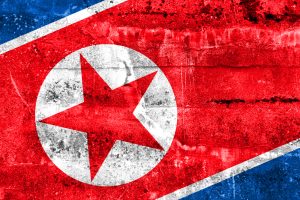Korean Central News Agency (KNCA), one of North Korea’s main state-controlled media, published a statement from Choe Ju Hyon, a North Korean international security analyst, furthering its efforts to frame the recent South Korea-U.S. combined military drills as a war rehearsal.
“The reckless military confrontational hysteria of the U.S. and its followers against the DPRK is driving the situation on the Korean peninsula to an irreversible catastrophe,” Choe said in his statement published on Thursday. (DRPK is an acronym of North Korea’s official name: Democratic People’s Republic of Korea.)
Narrating the South Korea-U.S. joint navy drills involving the U.S. nuclear carrier Nimitz and Aegis destroyers Wayne E. Meyer and Decatur, Choe reiterated Pyongyang’s belligerent stance over the drills. South Korea and the U.S. kicked off their regular springtime military drills last month. In the past few weeks, Seoul and Washington have conducted joint air and navy drills which were scaled up to strengthen deterrence capabilities against the North’s nuclear and missile threats. Choe said that the scale of the South Korea-U.S. joint military drills held this year is unprecedented.
“The U.S. has staged more than tens of war drills for aggression, including the longest-ever Freedom Shield joint military exercises and the largest-ever Ssangyong joint landing drills, to attack and occupy the inviolable DPRK since March,” Choe said. “Witnessing such dreary situation prevailing in the Korean peninsula, anyone with common sense and reason can easily notice who the arch criminal escalating tension is and what the malignant factor of bringing the fiery clouds is.” He even said that the U.S. and South Korea are not following the hopes of the international community to remove “the dark clouds of a nuclear war hanging over the Korean Peninsula.” Choe kept silent on the matter of North Korea’s continuous efforts to beef up its nuclear capabilities amid the stalled nuclear talks.
Despite Pyongyang’s incessant demands that Seoul and Washington immediately halt their joint military drills, it is unlikely that they will comply. Amid rising tension between the U.S. and China and Russia, the trilateral cooperation between the U.S., South Korea and Japan has dramatically strengthened. Ostensibly, a new Cold War has begun on the Korean Peninsula; it could possibly become a proxy competition between the U.S. and China.
With this, the Yoon Suk-yeol administration in South Korea has begun raising its voice on the draconian human rights situation in North Korea. Such direct agitation over the North’s human rights violations was temporarily halted when Moon Jae-in, Yoon’s predecessor, initiated a peace process centered on his dovish policy to entice the North Korean leader Kim Jong Un to make substantive steps toward denuclearization. However, no constructive progress was made in the wake of the breakdown of the Hanoi summit between then-U.S. President Donald Trump and Kim in February 2019.
With no changes in the fundamental approach of the current Biden administration’s policy on North Korea — an upgraded version of the Obama administration’s strategic patience approach — and external security conflicts in Ukraine and the South China Sea, Pyongyang is unlikely to yield before the strengthening alliance of the U.S. and South Korea.
Considering the North’s ongoing preparations for its seventh nuclear test and the first military reconnaissance test (which was announced to take place in April), North Korea may likely show off its missile capabilities again in order to pressure the South and the U.S. that no measure can contain its missile development. Alongside its bolstering efforts to build up a more powerful nuclear weapon programs, it will also actively respond to the international community’s initiatives to tackle its devastating human rights violations by claiming such actions are the interferences of the sovereignty of North Korea.

































